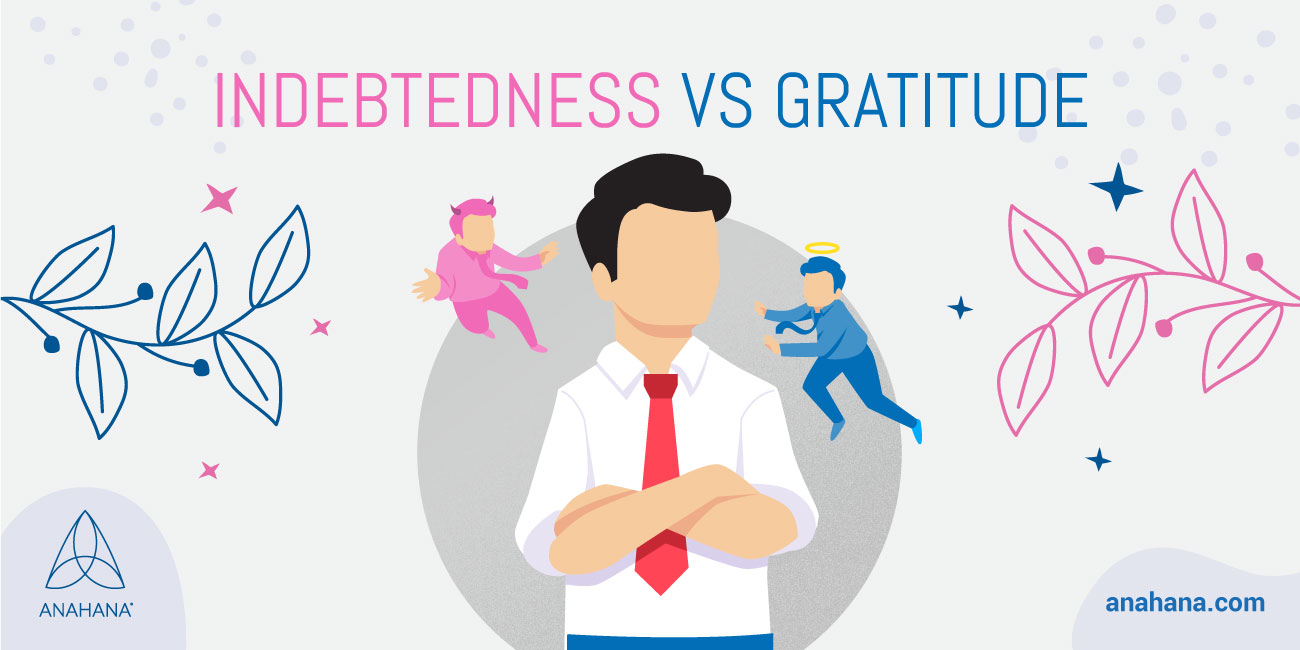
Table of Contents
Developing an attitude of gratitude can create tremendous changes in our lives and even lead to better mental health. Read this article for tips on how to cultivate more gratitude.
Gratitude Explained
 Gratitude, described as thankfulness and gratefulness, is derived from the Latin word gratus, meaning graciousness, grace or gratefulness. It is regarded as a positive response and spontaneous appreciation in response to what individuals receive from others, tangible or intangible.
Gratitude, described as thankfulness and gratefulness, is derived from the Latin word gratus, meaning graciousness, grace or gratefulness. It is regarded as a positive response and spontaneous appreciation in response to what individuals receive from others, tangible or intangible.
Gratitude encompasses the willingness of individuals to perceive the goodness they receive and is increasingly practiced as a value in various cultures.
Individuals may express gratitude through gifts, help, favors or generosity between one individual and another. Gratitude can be described as an emotion, while some studies suggest it is a process.
The Process of Gratitude
The first part of the process is the affirmation of goodness when individuals notice the good around them. The second is recognizing an external source of goodness - other individuals, fate, the natural world, or a higher power - which means acknowledging that an individual has achieved a positive outcome and an external source resulted in that outcome.
The History Behind Gratitude
Gratitude is studied in various religions and has been a topic of interest to ancient, medieval and modern philosophers. The study of gratitude started in 1998 when Martin Seligman introduced the concept of positive psychology in social psychology.
Positive psychology focuses on reinforcing positive traits. The study of gratitude investigates individual differences in how they experience gratitude, trait gratitude, and the short-term gratitude response, state gratitude.
Altruism and Gratitude
However, before introducing positive psychology, Robert Trivers introduced the theory of reciprocal altruism in 1971. The theory suggests that gratitude regulates individuals’ response to altruistic acts by others, which motivates the individual’s response. Gratitude researcher Michael McCullough has explained that gratitude can alert individuals to the benefits they receive from others, inspiring them to reciprocate the feeling of appreciation.
Reciprocity, therefore, has been a fundamental concept in the evolution of gratitude. The ability of humans to express emotions through reciprocity, altruism and language goes hand in hand with the expression of gratitude. The definition of gratitude and its practice is also evolving in individuals and cultures, and gratitude is now considered a universal value or emotion.
Indebtedness vs. Gratitude
 Many individuals confuse feelings of indebtedness and gratitude. While both emotions occur in response to favors or help from others, they result in different actions. For example, individuals who feel indebted feel obligated to pay back an individual. In contrast, an individual feeling gratitude wants to improve their relationship and seek out their benefactor.
Many individuals confuse feelings of indebtedness and gratitude. While both emotions occur in response to favors or help from others, they result in different actions. For example, individuals who feel indebted feel obligated to pay back an individual. In contrast, an individual feeling gratitude wants to improve their relationship and seek out their benefactor.
A difference between gratitude and indebtedness can be seen in a study that investigated the feelings of migrant adolescents toward their parents. The results demonstrated that the purpose of gratitude is to serve, and indebtedness challenges intergenerational relations following migration.
It was also found that when individuals expect more from the benefactor, the beneficiary's gratitude decreases while indebtedness increases.
Gratitude is a domino effect. A person experiencing gratitude is more likely to recognize the help of other individuals and reciprocate that help while strengthening their bond or relationship. In contrast, when individuals feel indebted, they do not reciprocate the emotion of appreciation or social connection.
Importance of Gratitude
The positive effects of expressing and experiencing gratitude are endless. Happiness studies demonstrate that gratitude boosts happiness and leads to psychological and physical health, especially among individuals experiencing mental health issues. Individuals expressing gratitude have higher subjective well-being, a sense of purpose, greater control over their lives, and better mental health.
Gratitude can help individuals cope with crises. Cultivating gratitude builds a psychological immune system that cushions individuals when falling. Scientific evidence shows grateful individuals are more resilient to dress from major personal upheavals or everyday hassles.
Remembering the suffering, sorrow, loss, and sadness and reflecting on where individuals are at the present moment can evoke a sense of gratitude. Individuals that demonstrate gratitude contrast the positive times with more challenging ones in the past, enhancing their overall well-being.
This process allows individuals to cope with challenges and adversities gratefully and cultivate a sense of gratitude, making them feel grateful.
Gratitude and Mental Health
 There are various benefits of gratitude on an individual’s psychological or mental health. Firstly, gratitude helps relieve pain and stress. Parts of the brain linked to gratitude are neural networks or “mu opioid networks” that light up when individuals experience pleasure or socialize with others.
There are various benefits of gratitude on an individual’s psychological or mental health. Firstly, gratitude helps relieve pain and stress. Parts of the brain linked to gratitude are neural networks or “mu opioid networks” that light up when individuals experience pleasure or socialize with others.
The neural networks are also connected to other areas of the brain that regulate and control basic emotions, including arousal and heart rate levels associated with pain reduction and stress relief. Lower levels of stress and pain can then lead to improved mental health in individuals and are associated with more gratitude practice.
Furthermore, gratitude can also help individuals with depression. Research demonstrates that practicing gratitude alters brain function by inducing structural changes in parts of the brain that are active during depression. In addition, studies demonstrate that a gratitude intervention successfully increases mental resilience in older adults.
Grateful people are more aware of the goodness surrounding them, which helps accentuate feelings of positive emotion, happiness and optimism. Practicing gratitude helps the brain react more sensitively to the experience of gratitude in the future, resulting in significantly better mental health.
Gratitude affirms positive emotions in individuals and shifts attention away from negative feelings such as envy and resentment, increasing mental resilience and minimizing the probability of ruminating. Negative emotions are a hallmark of depression. Therefore, grateful individuals are less likely to experience depression.
Furthermore, individuals who practice gratitude experience more positive emotions, experience less stress, are less likely to suffer from insomnia and have stronger immune systems.
Gratitude and Physical Health
 Practicing gratitude also improves an individual's physical health. Studies randomly assigned teens to three groups. The control group did not write gratitude letters, while teens in the second and third groups wrote gratitude letters weekly.
Practicing gratitude also improves an individual's physical health. Studies randomly assigned teens to three groups. The control group did not write gratitude letters, while teens in the second and third groups wrote gratitude letters weekly.
The results showed that teens who practiced gratitude and wrote gratitude letters were more inclined to eat healthier and engage in physical activity. However, they continued to feel that way even after their gratitude writing ended.
Another physical benefit of practicing gratitude is that it calms the nervous system through physiological changes. Common physiological changes associated with gratitude include an increase in vagal tone, an index of higher parasympathetic influence on the peripheral nervous system, and a decrease in blood pressure.
The parasympathetic nervous system stimulated by the vagal tone allows the body to conserve energy by stimulating digestion, slowing the heart rate, and resulting in relaxation. Gratitude works by soothing the nervous system.
Research demonstrates that patients with heart failure who were placed in a journaling group showed greater variability in parasympathetic heart rate, a sign of better heart and cardiovascular health.
Individual Differences in Gratitude
There are differences in the way individuals practice, view and experience gratitude. Recent research has investigated individuals' differences in gratitude and established scales that measure individual differences.
The scales measure various aspects of gratitude, including an appreciation for the present moment, people, rituals, social comparisons, possessions and existential concerns. Other scales assess gratitude towards the world and others and a lack of resentment for what individuals lack. Some of these scales include the GRAT, the Appreciation scale and the GQ6.
Spirituality and Gratitude
The association between gratitude and spirituality has recently been investigated. While the association between spirituality and gratitude has not been well established, research shows that spirituality can influence and enhance an individual’s ability to practice gratitude. Individuals who attend or engage in religious services and activities are more likely to have a greater sense of gratitude in life.
Gratitude is common in religions, including Islam, Christianity and Judaism. Therefore, it is a common emotion that religions emphasize and evoke in followers and is regarded as a universal emotion or value.
Islamic Conceptions of Gratitude
The sacred text, the Quran, emphasizes the value of gratitude and encourages its followers to express thanks to Allah and to be grateful in all circumstances. Islamic teachings emphasize that those who practice gratitude receive greater rewards in life.
Many Islamic practices also promote gratitude. For instance, the Pillar of Islam emphasizing daily prayer encourages believers to pray to God five times daily to express gratitude, and the pillar of fasting also aims to put believers in a state of gratitude.
Christian Conceptions of Gratitude
Gratitude shapes Christianity and is called “the heart of the gospel.” In Christianity, believers are always encouraged to be grateful to their creator, the selfless giver of all good in life.
The sense of gratitude and gratefulness fosters a common bond among Christians, shaping all aspects of an individual’s life, including their actions and deeds. Thanksgiving, for example, is acknowledging God’s generosity and being grateful for all that individuals have in their lives.
Conceptions of Gratitude in Judaism
Gratitude is an essential part of worship in Judaism. Based on the Hebrew worldview, everything comes from God, which is extremely important to the believers of Judaism.
Practices in Judaism, including the central thrice-daily prayer, the Amidah, speak of gratitude by thanking God for the individual's destiny. In addition, there is great emphasis on acts of goodness and kindness. For example, the Hebrew term for gratitude is "hakarat hatov," which means recognizing the good.
Tips to Express Gratitude
 There are various ways to help cultivate gratitude in individuals. Some ways to foster gratitude include daily gratitude journaling; tracking life's big and little joys of life in a gratitude journal can help an individual practice gratitude.
There are various ways to help cultivate gratitude in individuals. Some ways to foster gratitude include daily gratitude journaling; tracking life's big and little joys of life in a gratitude journal can help an individual practice gratitude.
Scientists investigating gratitude interventions, such as journals and letters, in college students have found an increase in happiness scores and a boost in positive affect in the gratitude group. Journaling or writing gratitude letters may benefit individuals seeking mental health counselling services.
Gratitude Journal
Gratitude letter writing or journaling is a type of written gratitude practice that can help convey an appreciation for someone in an individual’s life. Sharing gratitude with a family member or friends, even around the dinner table, can result in strong relationships. The practice results in more positive perceptions of friends, family or partners with greater trust.
In addition, research demonstrates that gratitude's biggest short-term effects come from a gratitude visit, where participants write and deliver a thank you letter of gratitude to individuals in their daily life. A gratitude journal or a gratitude letter allows individuals to count their blessings. Praying, meditation and thanking someone is other ways to practice gratitude regularly.
Meditation can help cultivate gratitude and thankfulness by being more aware and mindful of one’s surroundings through their senses and picking up things that bring an individual satisfaction or happiness.
Mindful meditation involves focusing on the present without judgment and focusing on what an individual is grateful for (warmth of the sun, a pleasant sound, or an individual).
Spreading gratitude through social media is another way to cultivate gratitude; sharing uplifting moments or lessons and uplifting others will create the domino effect of gratitude. In addition, sharing and keeping a list of gratitude quotes can help individuals turn to it for inspiration or make it through a challenging day.
A grateful person always counts their blessings. Counting blessings versus burdens is the basis of practicing gratitude, resulting in positive emotion.
Conclusion
The relationship between gratitude and increased life satisfaction is well-established in research. With practice, individuals can learn to navigate challenges with gratitude and learn to view the bigger picture. Subsequently, gratitude writing has numerous benefits for everyone involved, including social and individual benefits.
While gratitude begins with one individual, the effects of gratitude may spread throughout a social network or into a dyadic relationship. Individuals can practice gratitude to widen their circle of appreciation and be mindful of themselves, others and the environment, besides enhancing their well-being.
References
- Edutopia - “Showing Gratitude to School Staff” - https://www.edutopia.org/article/showing-gratitude-school-staff
- University of Virginia - “HOO GRATI- HOO-D” - https://apple.studenthealth.virginia.edu/sites/apple/files/2023-08/GratitudeforWeb.pdf
- University of Michigan - “THE POWER OF GRATITUDE: At-a-Glance” - https://positiveorgs.bus.umich.edu/wp-content/uploads/Glance-Gratitude.pdf
- Greater Good Science Center at UC Berkeley - “The Science of Gratitude” - https://greatergood.berkeley.edu/topic/gratitude/definition#what-is-gratitude
- Harvard Health Publishing - “Giving thanks can make you happier” - https://www.health.harvard.edu/healthbeat/giving-thanks-can-make-you-happier
DISCLAIMER
The contents of this article are provided for informational purposes only and are not intended to substitute for professional medical advice, diagnosis, or treatment. It is always recommended to consult with a qualified healthcare provider before making any health-related changes or if you have any questions or concerns about your health. Anahana is not liable for any errors, omissions, or consequences that may occur from using the information provided.

By: Anahana
The Anahana team of researchers, writers, topic experts, and computer scientists come together worldwide to create educational and practical wellbeing articles, courses, and technology. Experienced professionals in mental and physical health, meditation, yoga, pilates, and many other fields collaborate to make complex topics easy to understand. Anahana is also home to specialists in crystals, tarot, angel numbers, astrology, life path numbers, zodiac signs, and horoscopes. By combining evidence-based wellness with spiritual and energetic practices, the team offers clear, trustworthy guidance for both mind-body health and modern spirituality.